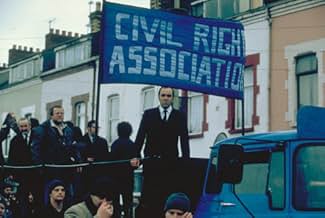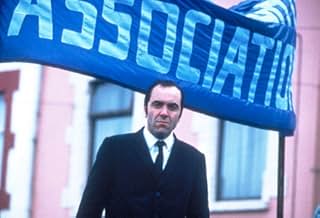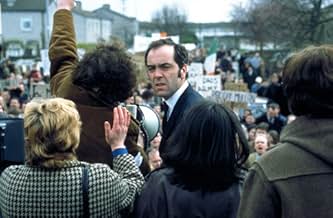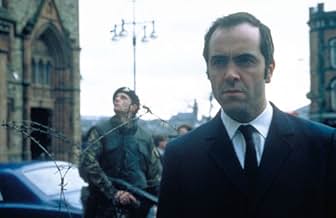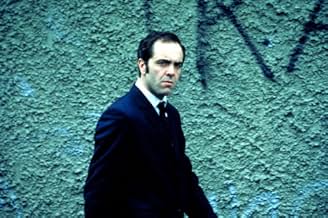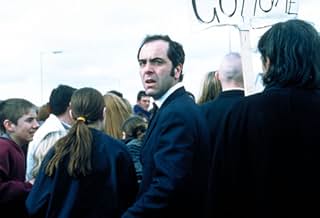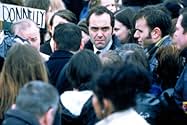IMDb रेटिंग
7.6/10
26 हज़ार
आपकी रेटिंग
अपनी भाषा में प्लॉट जोड़ेंA dramatization of the Irish civil rights protest march and subsequent massacre by British troops on January 30, 1972.A dramatization of the Irish civil rights protest march and subsequent massacre by British troops on January 30, 1972.A dramatization of the Irish civil rights protest march and subsequent massacre by British troops on January 30, 1972.
- 1 BAFTA अवार्ड जीते गए
- 19 जीत और कुल 23 नामांकन
Carmel McCallion
- Bridget Bond
- (as Carmel Mccallion)
Christopher Villiers
- Maj. Steele
- (as Chris Villiers)
फ़ीचर्ड समीक्षाएं
10mariobc
I saw this film about 2 years ago, and was extremely impressed with the realism of the film.Having served with the British Army in Northern Ireland many years later I found the atmosphere and the general appearance and manner of the Paras extremely accurate, as I have seen many films about Ireland when trying to portray British soldiers they unfortunately could of done a little better. I consider myself to be open minded and understood and sympathized with the local catholic population during these events as this is or was pretty much how things are with regards to the catholic population in Northern Ireland.For me, the main good points were that the film was made in a documentary style in which the facts were shown in a straight to the point manner without any fancy computer effects or handsome faces portraying the main players. well done to the production team !!!!
I thought this was an amazing movie.
Now I learned about this in school for a while and as an Englishman I do feel a certain, oblique connection to the troubles. I didn't realise this kind of thing could happen among my compatriots (I'm not trying to belittle Irish Nationalism by calling the Northern Irish my compatriots, it's just how I have come to see them), and I hadn't realised I'd thought this way. It was a real consciousness raiser for me.
My biases notwithstanding, this movie is as a hypnotic account of a confusing episode of an even more confusing time. It has the task of representing the mindset of the times, the mindsets, I should say, while still making it into a spontaneous narrative.
I'm not an expert so I cannot vouch for the authenticity of any of this, but I feel I can believe all of it. There is a tendency for us to demarcate history from real life. A million deths is a statistic as Stalin said. But here I really feel history and the lives of regular people converge in a devastating way.
At its heart I suppose the movie is a mystery. Not so much who-done-it but a why-did-it. I really felt while I was watching, all the chaos and threat that leads to tragedy while still feeling baffled and disorientated throughout. It feels like a documentary. The dialogue is spontaneous but still rich with nuance. The cinematography is candid and even shaky, giving it an often hypnotic, Blair Witch quality.
A movie to never forget.
Now I learned about this in school for a while and as an Englishman I do feel a certain, oblique connection to the troubles. I didn't realise this kind of thing could happen among my compatriots (I'm not trying to belittle Irish Nationalism by calling the Northern Irish my compatriots, it's just how I have come to see them), and I hadn't realised I'd thought this way. It was a real consciousness raiser for me.
My biases notwithstanding, this movie is as a hypnotic account of a confusing episode of an even more confusing time. It has the task of representing the mindset of the times, the mindsets, I should say, while still making it into a spontaneous narrative.
I'm not an expert so I cannot vouch for the authenticity of any of this, but I feel I can believe all of it. There is a tendency for us to demarcate history from real life. A million deths is a statistic as Stalin said. But here I really feel history and the lives of regular people converge in a devastating way.
At its heart I suppose the movie is a mystery. Not so much who-done-it but a why-did-it. I really felt while I was watching, all the chaos and threat that leads to tragedy while still feeling baffled and disorientated throughout. It feels like a documentary. The dialogue is spontaneous but still rich with nuance. The cinematography is candid and even shaky, giving it an often hypnotic, Blair Witch quality.
A movie to never forget.
"Bloody Sunday" is a very startling, cinema-verite recreation of a very specific date (January 30, 1972), in a very specific place (Derry, Northern Ireland) of an event that for the Irish became "our Sharpeville."
But for an American audience with no benefit of subtitles for the brogues and working class Brit accents, no explanations outside of eventual context for lingo and slang (it took me awhile to keep track of "provos" vs "paras"), the quasi-documentary, in-your-face approach takes on a tragic universality.
It could be part of a Cassandra trilogy with `Black Hawk Down' and `No Man's Land' about why military should not be in charge in urban strife, whether as "peacekeepers" or in civil wars or regime changes, no matter how heinous the regime to be changed. A lesson for the Baghdad invasion planners?
Cities are complicated social ecologies, and the film shows a great diversity of attitudes and pressures on all sides, managing to be both clinical in meticulous detail and visceral in shocking impact. The film is probably not objective about the British (I don't think it's a coincidence that the imperious Brit "observer" who takes repugnant charge is played by Tim Pigott-Smith who was a similar colonialist in `The Jewel in the Crown.") A central universal image becomes the awesome power of rock-throwing, unemployed teen-age boys to spark war.
The liberals in the middle, clinging to dreams of Gandhi, Martin Luther King, and fair community relations, are morally destroyed over the course of a few hours and the extremists with guns on both sides feed on each other in perpetual destruction like the ouroboros image of the snake eating itself. I kept feeling I missed the exact flash point in a wandering attention moment and wanted to immediately re-watch it to see if I could track the gotcha! moment when escalation could have been prevented, so I look forward to this being available on video tape.
But the film does clearly show that it was attitudes that created the violent outcome and consequent government non-investigation, as we see in so many police situations. Once soldiers enter a city it is a police situation with all those complexities.
I know James Nesbitt primarily from frothy Irish comedies, like `BallykissAngel,' so his staggering portrayal of the M.P. in the middle is a revelation, as he goes from planning a civil rights march to pleading with his girlfriend to physical heroism to a break-down in shock.
The version of the titular U2 song played out at the end, running well past the credits finish, is a moving, live, passionate audience sing-along where Bono shouts out other locales that have experienced similar situations to emphasize the universality.
But for an American audience with no benefit of subtitles for the brogues and working class Brit accents, no explanations outside of eventual context for lingo and slang (it took me awhile to keep track of "provos" vs "paras"), the quasi-documentary, in-your-face approach takes on a tragic universality.
It could be part of a Cassandra trilogy with `Black Hawk Down' and `No Man's Land' about why military should not be in charge in urban strife, whether as "peacekeepers" or in civil wars or regime changes, no matter how heinous the regime to be changed. A lesson for the Baghdad invasion planners?
Cities are complicated social ecologies, and the film shows a great diversity of attitudes and pressures on all sides, managing to be both clinical in meticulous detail and visceral in shocking impact. The film is probably not objective about the British (I don't think it's a coincidence that the imperious Brit "observer" who takes repugnant charge is played by Tim Pigott-Smith who was a similar colonialist in `The Jewel in the Crown.") A central universal image becomes the awesome power of rock-throwing, unemployed teen-age boys to spark war.
The liberals in the middle, clinging to dreams of Gandhi, Martin Luther King, and fair community relations, are morally destroyed over the course of a few hours and the extremists with guns on both sides feed on each other in perpetual destruction like the ouroboros image of the snake eating itself. I kept feeling I missed the exact flash point in a wandering attention moment and wanted to immediately re-watch it to see if I could track the gotcha! moment when escalation could have been prevented, so I look forward to this being available on video tape.
But the film does clearly show that it was attitudes that created the violent outcome and consequent government non-investigation, as we see in so many police situations. Once soldiers enter a city it is a police situation with all those complexities.
I know James Nesbitt primarily from frothy Irish comedies, like `BallykissAngel,' so his staggering portrayal of the M.P. in the middle is a revelation, as he goes from planning a civil rights march to pleading with his girlfriend to physical heroism to a break-down in shock.
The version of the titular U2 song played out at the end, running well past the credits finish, is a moving, live, passionate audience sing-along where Bono shouts out other locales that have experienced similar situations to emphasize the universality.
Although initially difficult to get into, Bloody Sunday proved worthwhile persevering, as the latter half puts the viewer in the carnage.
The acting, especially James Nesbit is excellent, the recreation of the mood is superb although it was obvious with the constant close ups that there was very little budget to recreate the scenery. The geography was never explained and therefore would leave a viewer without prior knowledge of the area disorientated.
The documentary suffered from not being able to set the scene, a lot had happened in the week prior to the Civil Rights march that put both the participants and the security forces on edge and made the advance more significant. The question of why the Paras were sent to Derry were never fully explored.
Overall it was flawless recreation of events from the point of view taken by the film makers on this particular incident. It is worth noting that this is based on the Irish Governments review of the Widgery report into Bloody Sunday. (NB the Widgery report is mostly considered by nationalists to be a white wash)
The acting, especially James Nesbit is excellent, the recreation of the mood is superb although it was obvious with the constant close ups that there was very little budget to recreate the scenery. The geography was never explained and therefore would leave a viewer without prior knowledge of the area disorientated.
The documentary suffered from not being able to set the scene, a lot had happened in the week prior to the Civil Rights march that put both the participants and the security forces on edge and made the advance more significant. The question of why the Paras were sent to Derry were never fully explored.
Overall it was flawless recreation of events from the point of view taken by the film makers on this particular incident. It is worth noting that this is based on the Irish Governments review of the Widgery report into Bloody Sunday. (NB the Widgery report is mostly considered by nationalists to be a white wash)
Obviously an important day in history, and the events of that day are breathtakingly conveyed by the best Docudrama filmmaker we have, Paul Greengrass, Before we Knew who he was-and that may have made a certain difference in my experience of the film-it was more exhilarating (and impressive) before Greengrass had made a name for himself at this kind of documentary-styled filmmaking. This one, when it came out, definitely gave me goosebumps....todd gold
क्या आपको पता है
- ट्रिवियाTo make this movie as authentic as possible, no lights were used in the movie and the camera work was entirely hand-held
- गूफ़The marchers carry homemade cardboard signs with slogans written on them. When shown from behind, some have modern printing ("Made in China") on them that are not appropriate for 1972.
- भाव
Ivan Cooper: I just want to say this to the British Government... You know what you've just done, don't you? You've destroyed the civil rights movement, and you've given the IRA the biggest victory it will ever have. All over this city tonight, young men... boys will be joining the IRA, and you will reap a whirlwind.
- क्रेज़ी क्रेडिटThe live rendition of U2's Sunday, Bloody Sunday continues to play for a full three minutes over a black screen after the credits finish rolling.
- कनेक्शनFeatured in The 2003 IFP Independent Spirit Awards (2003)
टॉप पसंद
रेटिंग देने के लिए साइन-इन करें और वैयक्तिकृत सुझावों के लिए वॉचलिस्ट करें
विवरण
- रिलीज़ की तारीख़
- कंट्री ऑफ़ ओरिजिन
- भाषा
- इस रूप में भी जाना जाता है
- Domingo sangriento
- फ़िल्माने की जगहें
- उत्पादन कंपनियां
- IMDbPro पर और कंपनी क्रेडिट देखें
बॉक्स ऑफ़िस
- बजट
- £20,00,000(अनुमानित)
- US और कनाडा में सकल
- $7,73,228
- US और कनाडा में पहले सप्ताह में कुल कमाई
- $29,419
- 6 अक्टू॰ 2002
- दुनिया भर में सकल
- $17,58,689
- चलने की अवधि
- 1 घं 51 मि(111 min)
- रंग
- ध्वनि मिश्रण
- पक्ष अनुपात
- 1.85 : 1
इस पेज में योगदान दें
किसी बदलाव का सुझाव दें या अनुपलब्ध कॉन्टेंट जोड़ें

